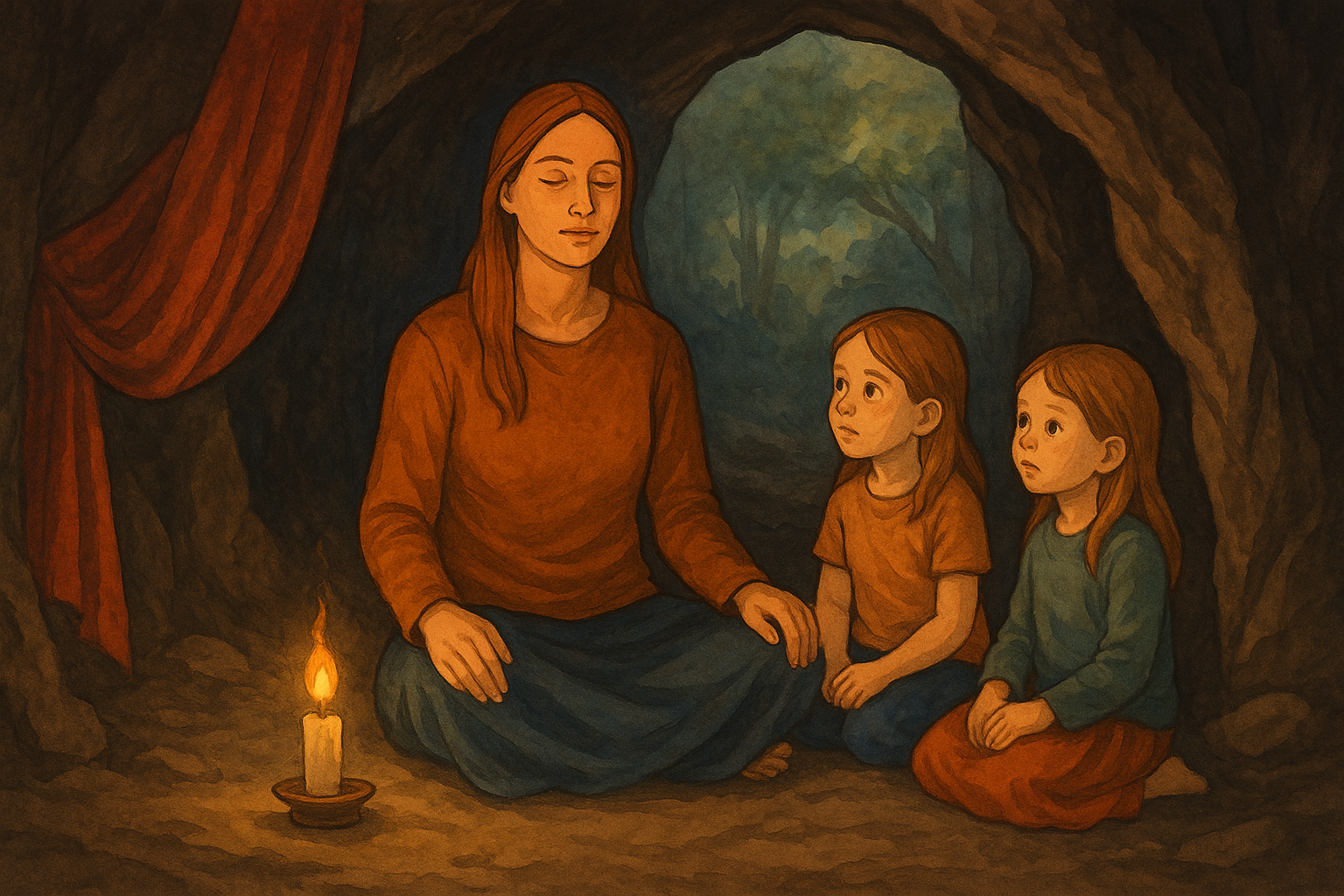In an astonishing discovery that has captivated global attention, a Russian mother and her two young daughters were found living in isolation in a forest cave in southern India. The incident occurred near Ramatirtha Hill in Karnataka state, a well-known coastal tourist destination, where the family had been living peacefully for over a week before being located by local police.
Routine Patrol Leads to Unexpected Discovery
On July 9, police officers patrolling the area near Ramatirtha Hill came across a unique and unexpected sight — a Russian mother, later identified as 40-year-old Nina Kutina, and her daughters, aged six and four, living in a remote forest cave. The location, known for its scenic beauty and spiritual vibes, became a temporary home for the family who had retreated from society in search of peace and devotion.
Officer Sridhar S.R., who led the patrol, stated that the family had created a modest but spiritual living space inside the cave. Kutina was found meditating by candlelight, surrounded by images of Hindu deities adorning the cave walls. Red saris hung at the entrance, forming makeshift curtains, which further added a sense of privacy and sanctity to their forest dwelling.
A Life of Solitude, Spirituality, and Simplicity
According to the police report, the Russian mother expressed a deep desire to live close to nature and worship God. “She told us she wanted to live peacefully in the forest and focus on spiritual practices,” Sridhar noted. Her daily routine reportedly involved painting, reading, singing, and spending quality time with her daughters — all away from the noise of modern society.
The Russian mother had previously worked as a Russian language tutor in Goa, a coastal Indian state known for its expat communities and relaxed lifestyle. Her visa had expired, but instead of returning to Russia, she chose to venture deeper into India, eventually settling in the Karnataka forest with her children.
Legal Complications Over Visa Violation
While the story of the Russian mother living in a cave might seem like a spiritual adventure, it has now taken a legal turn. Local authorities discovered that Kutina had overstayed her visa and was living in India illegally. She and her daughters were moved to a detention facility for foreigners who have violated immigration laws.
Indian officials are now taking steps to repatriate the Russian mother and her children to Russia. The Russian Embassy in New Delhi has yet to release an official statement, but local law enforcement confirmed that the diplomatic process for repatriation is underway.
Emotional Goodbye to a Peaceful Life
In a message sent to her friends after being taken into custody, the Russian mother wrote, “Our peaceful life in the cave has ended — our cave home destroyed.” The message underscores the emotional bond she had developed with her temporary life in the wilderness.
Photographs provided by the police show the Russian mother dressed in simple clothes, standing at the entrance of her cave home with her daughters. The scene resembles something out of a movie — a serene yet surreal blend of isolation, adventure, and inner peace.
Public Reaction and Human Interest
The story of the Russian mother has struck a chord worldwide, sparking conversations about modern-day spiritual quests, mental health, and the longing to escape urban chaos. Many have sympathized with her decision to live a simple, nature-bound life away from the pressures of modern civilization.
Social media has been abuzz with mixed reactions. Some applaud her courage and spiritual resolve, while others express concern about the safety and well-being of her children. Indian authorities have ensured that the children are healthy and receiving proper care at the detention center.
A Spiritual Adventure or a Risky Escape?
While the Russian mother has framed her journey as a spiritual adventure fueled by a love for God and nature, authorities are concerned about the legality and safety of such a lifestyle, especially when young children are involved. Living without basic amenities, medical care, or education can pose serious risks, and officials argue that such actions must be guided by law.
Nonetheless, the Russian mother’s tale is not one of negligence, but perhaps a different philosophy of life — one that values spiritual awakening, simplicity, and connection with nature over material pursuits.
Reflections on Spiritual Seeking in Modern Times
India has long attracted spiritual seekers from around the world, and the Russian mother’s journey is yet another chapter in that ongoing legacy. From ancient times, India’s forests, caves, and temples have been havens for sages, monks, and mystics seeking enlightenment.
Her story also reflects a rising global trend where individuals are choosing to live off-grid, explore minimalism, and reconnect with nature. Whether driven by personal loss, disillusionment, or spiritual yearning, these journeys often take people far from their homelands and into unfamiliar terrain.
What’s Next for the Russian Mother?
While the legal process unfolds, the Russian mother remains in custody along with her children. Indian immigration authorities are coordinating with the Russian government to facilitate her return. It is unclear whether she will face penalties upon return to Russia or receive any psychological or spiritual support.
For now, the world watches closely as this extraordinary story of a Russian mother comes to light — a story that merges solitude, maternal care, spirituality, and the complexities of global law in one remarkable narrative.
Conclusion
The story of Nina Kutina, the Russian mother who chose a cave in the Indian forest over conventional life, is a blend of mystery, spirituality, and humanity. It reveals a woman’s desire to live in harmony with nature, raise her children in peace, and worship in solitude. While legal complications cannot be ignored, the emotional depth and spiritual undertones of her journey have made headlines across the world.
As authorities prepare for the next steps, the Russian mother continues to be a symbol of personal freedom and spiritual pursuit — even as the world debates where to draw the line between lawful conduct and the human quest for deeper meaning.
